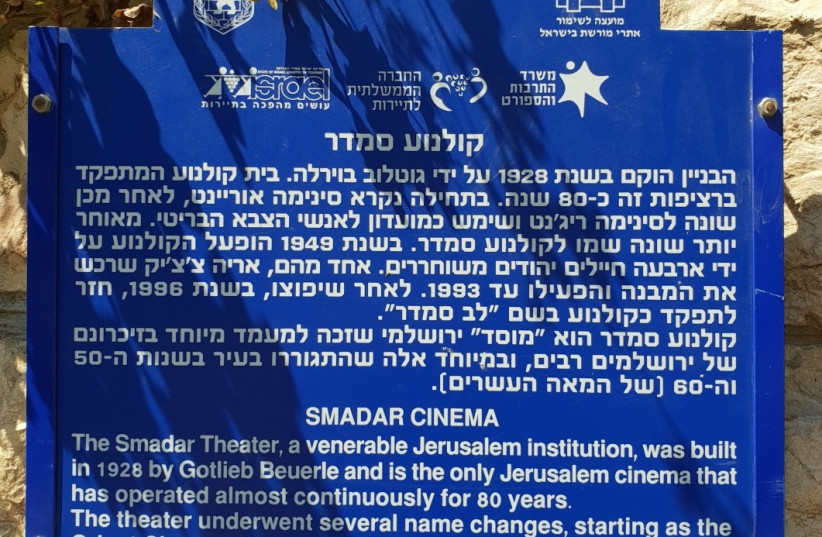The threat of closure has long hung over Lev Smadar cinema in the capital’s German Colony neighborhood.
In November 2016, the historic movie theater – constructed in 1928 – was saved as a result of the persistent struggle by residents and representatives on the city council. Under the leadership of then-deputy mayor Ofer Berkowitz (Hitorerut), a solution was found to prevent the closure of this Jerusalem entertainment icon.
Then-councilor Pepe Alalu (Meretz) arranged for Lev Smadar, which includes a hotel, restaurant, and movie theater, to be classified for cultural preservation – a decision that barred the door to real estate developers. The municipality agreed to mobilize funding via cultural services for residents, mainly teenagers and the elderly. Ultimately, the rescue operation was capped off with the national Lev Cinemas network agreeing to take over the daily work of running Lev Smadar.
Why is the Lev Smadar movie theater in danger of closing down?
Seven years have passed, and the danger of closure is once again at the cinema’s door, this time due to insufficient clientele and ongoing financial losses. The Lev network announced last week that it was leaving Jerusalem, and it is not clear at this point what will be done with the building, which can only be used for cultural purposes. The chain announced that it intends to end its operations in Jerusalem in about six months, informing the venue’s owners that it will be vacating on January 20, 2024, four years before the end of their contract, thanks to a clause which allows this with six months’ notice.
Anyone who has visited the Smadar cinema in recent times could see where things were headed. It did not recover post-COVID. It has continued to screen quality films, but to audiences of barely 10 to 20 people. The in-house eatery also decamped due to heavy financial losses resulting from the lack of customers. Except for Tuesdays, which offer discounted screenings for senior citizens, the cinema is usually nearly empty.

SEVERAL MONTHS ago, the property’s owners announced they were planning to sell the Smadar, either as one complex or as separate units. Now, with the news of Lev’s departure, several inquiries have been made to the owners this week.
Among the applicants are the neighboring Ginot Ha’Ir community administration and municipality, but there are still talks with potential buyers for the venue, which raises a lot of interest from real estate professionals, entrepreneurs, and various other entities.
While some local residents were reported to be happy about the Smadar shutdown – and with it, the welcome respite from the balagan that goes with living near an enterprise that operate throughout the week and late at night – this does not appear to be the prevailing sentiment in the area.
While it’s hard to pinpoint what led to Lev’s decision, it may simply be that residents are no longer interested in going to the cinema. While Smadar is dear to the hearts of many Jerusalemites, few rarely attend the films anymore.
SINCE LEV announced its intention to leave, public representatives are mobilizing once again, this time headed by Deputy Mayor Yossi Havilio (Save Jerusalem).
Havilio is advocating strongly for Jerusalem Mayor Moshe Lion to fund more municipal cultural services – such as movie tickets as part of a municipal “cultural basket” for students – which will, according to Havilio’s calculations, cost less than NIS 10 million.
However, the capital is now nearing municipal elections. Sources at Safra Square say there is no way that Mayor Lion, who is running for a second term, will risk voter criticism by transferring public funds for this purpose, since while Smadar is iconic, it is also very much a private business.
Will the municipality swoop in and save Smadar? That rescue scenario seems to be out of the question – at least until after the elections.
